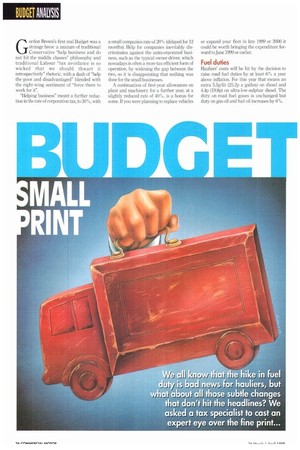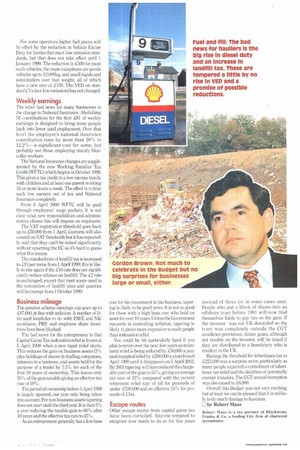BOUT ANESIS G orcion Brown's first real Budget was a strange
Page 38

Page 39

If you've noticed an error in this article please click here to report it so we can fix it.
brew: a mixture of traditional Conservative "help business and do not hit the middle classes" philosophy and traditional Labour "tax avoidance is so wicked that we should thwart it retrospectively" rhetoric, with a dash of "help the poor and disadvantaged" blended with the right-wing sentiment of "force them to work for it".
"Helping business" meant a further reduction in the rate of corporation tax, to 30%, with a small companies rate of 20% (delayed for 12 months). Help for companies inevitably discriminates against the unincorporated business, such as the typical owner-driver, which nowadays is often a more tax-efficient form of operation, by widening the gap between the two, so it is disappointing that nothing was done for the small businesses.
A continuation of first-year allowances on plant and machinery for a further year, at a slightly reduced rate of 40%, is a bonus for some. If you were planning to replace vehicles or expand your fleet in late 1999 or 2000 it could be worth bringing the expenditure forward to June 1999 or earlier,
Fuel duties
Hauliers' costs will be hit by the decision to raise road fuel duties by at least 6% a year above inflation. For this year that means an extra 5.5p/lit (252p a gallon) on diesel and 4.4p (19.8p) on ultra-low-sulphur diesel. The duty on road fuel gases is unchanged but duty on gas oil and fuel oil increases by 6%. For some operators higher fuel prices will be offset by the reduction in Vehicle Excise Duty for lorries that meet low emission standards, but that does not take effect until 1 January 1999. The reduction is ,C500 for most such vehicles; the main exceptions are goods vehicles up to 12,000kg, and small rigids and semi-trailers over that weight, all of which have a new rate of l'.150. The VET) on standard CVs (not low-emission) has not changed.
Weekly earnings
The other bad news for many businesses is the change to National Insurance. Abolishing NI contributions for the first al of weekly earnings is designed to bring more people back into lower paid employment. Over that level the employer's national insurance contribution rises by more than 20% to 12.2%—a significant cost for some, but probably not those employing mainly bluecollar workers.
The National Insurance changes are supplemented by the new Working Families Tax Credit (WFTC) which begins in October 1999. This gives a tax credit to a low-income family with children and at least one parent working 16 or more hours a week. The effect is to take such Tow earners out of tax and National Insurance completely.
From 6 April 2000 WFTC will be paid through employees' wage packets. It is not clear what new responsibilities and administrative chores this will impose on employers.
The VAT registration threshold goes back up to £50,000 from 1 April. Customs will also consult on VAT thresholds but it has repeatedly said that they can't be raised significantly without upsetting the EC so it's hard to guess what this means.
The standard rate of landfill tax is increased to 110 per tonne from 1 April 1999; this is likely to rise again if the £10 rate does not signifi cantly reduce reliance on landfill. The rate is unchanged, except that inert waste used in the restoration of landfill sites and quarries will be exempt from 1 October 1999.
Business mileage
The pension scheme earnings cap goes up to £87,600. in line with inflation. A number of little-used loopholes to do with PAYE and NIC avoidance, PRP, and employee share incentives have been blocked.
The bad news for the entrepreneur is that Capital Gains Tax indexation relief is frozen at 5 April 1998 when a new taper relief starts. This reduces the gain on business assets (5% plus holdings of shares in trading companies, interests in a business, and assets held for the purpose of a trade) by 7.5% for each of the first 10 years of ownership. This leaves only 25% of the gain taxable giving an effective tax rate of 10%.
The period of ownership before 5 Apri11998 is largely ignored, one year only being taken into account. For non-business assets tapering does not start until the third year. It is then 5% a year reducing the taxable wain to 60% after 10 years and the effective tax rate to 25%.
As an entrepreneur generally has a low base cost for his investment in his business, tapering is likely to be good news. It is not so good for those with a high base cost who hold an asset for over 10 years. Unless the Government succeeds in controlling inflation, tapering is likely to prove more expensive to such people than indexation relief.
You could be hit particularly hard if you plan to retire over the next few years as retirement relief is being reduced by 450,000 a year (and marginal relief by .E200,000 a year) from 6 April 1999 until it disappears on 5 April 2003. By 2003 tapering will have reduced the chargeable part of the gain to 55%, giving an average tax rate of 22% compared with the current retirement relief rate of nil for proceeds of under £250,000 and an effective 15% for proceeds of Lim.
Escape routes
Other escape routes from capital gains tax have been curtailed. Anyone tempted to emigrate now needs to do so for five years instead of three (or in some cases one). People who put a block of shares into an offshore trust before 1991 will now find themselves liable to pay tax on the gain. If the investor was not UK domiciled so the trust was completely outside the CGT avoidance provisions, future gains, although not taxable on the investor, will be taxed if they are distributed to a beneficiary who is resident in the UK.
Raising the threshold for inheritance tax to .C223,000 was a surprise move, particularly as many people expected a curtailment of inheritance tax relief and the abolition of potentially exempt transfers. The CGT annual exemption was also raised to £6,800.
Overall this Budget was not very exciting, but at least we can be pleased that it is unlikely to do much damage to business.
CI by Robert Maas
Robert Maas is a tax partner of Blackstone Franks & Co, a leading City firm of chartered accountants.




































































































